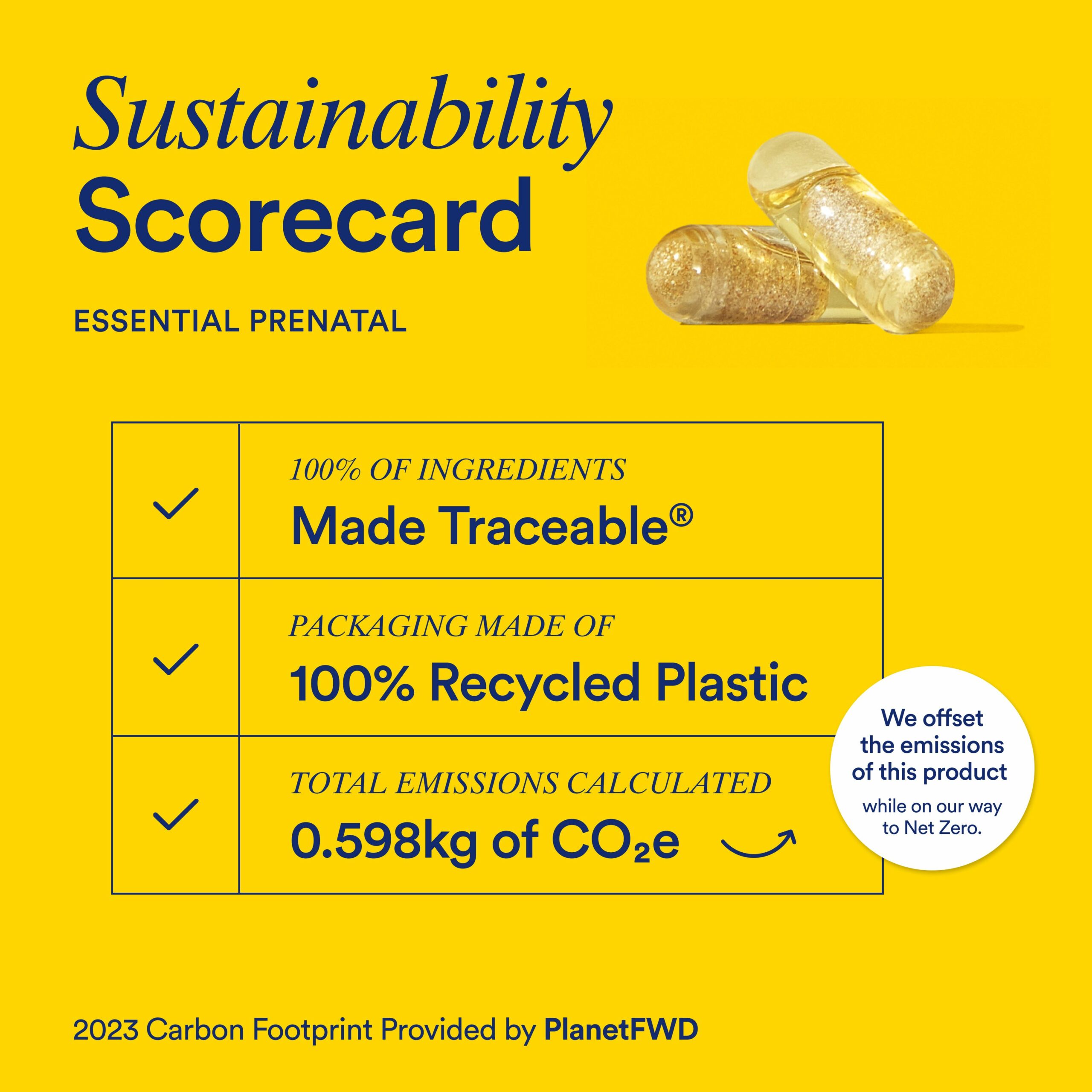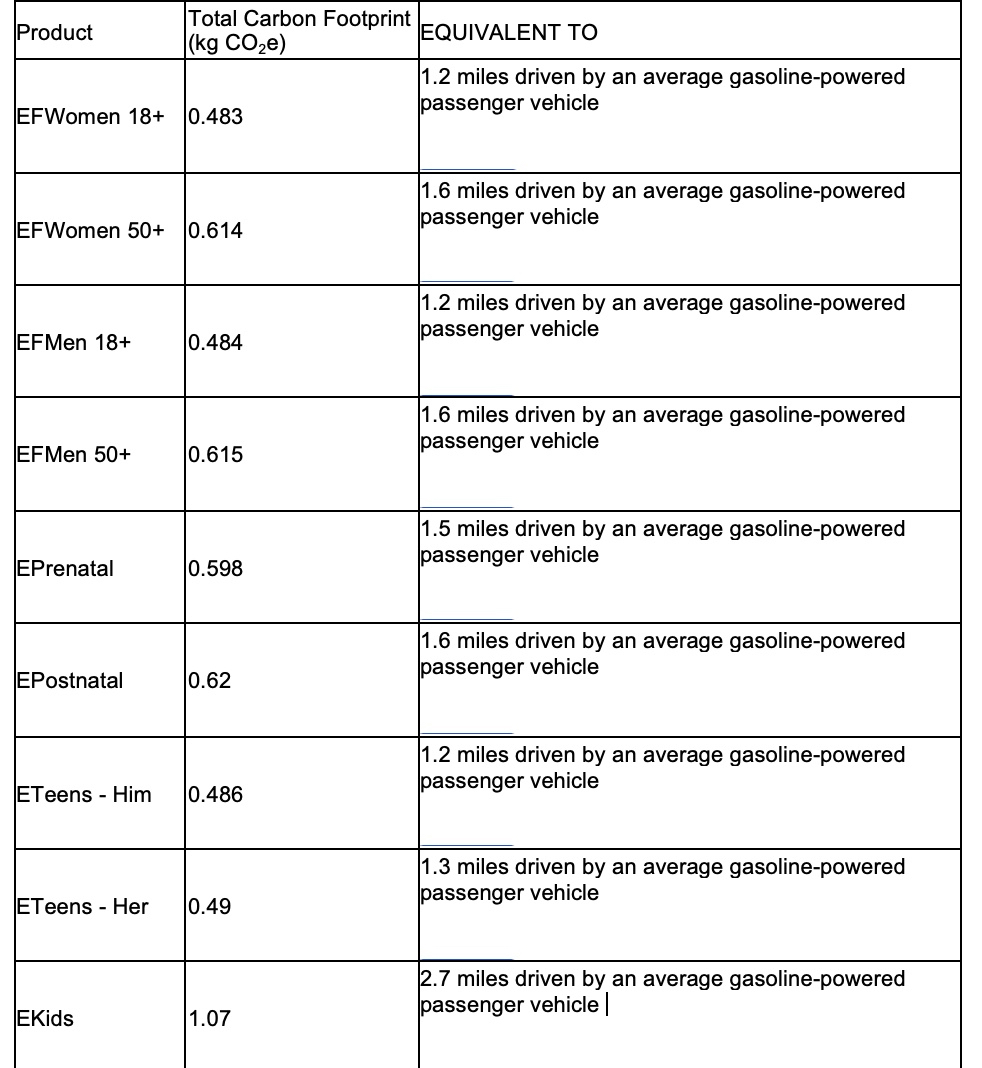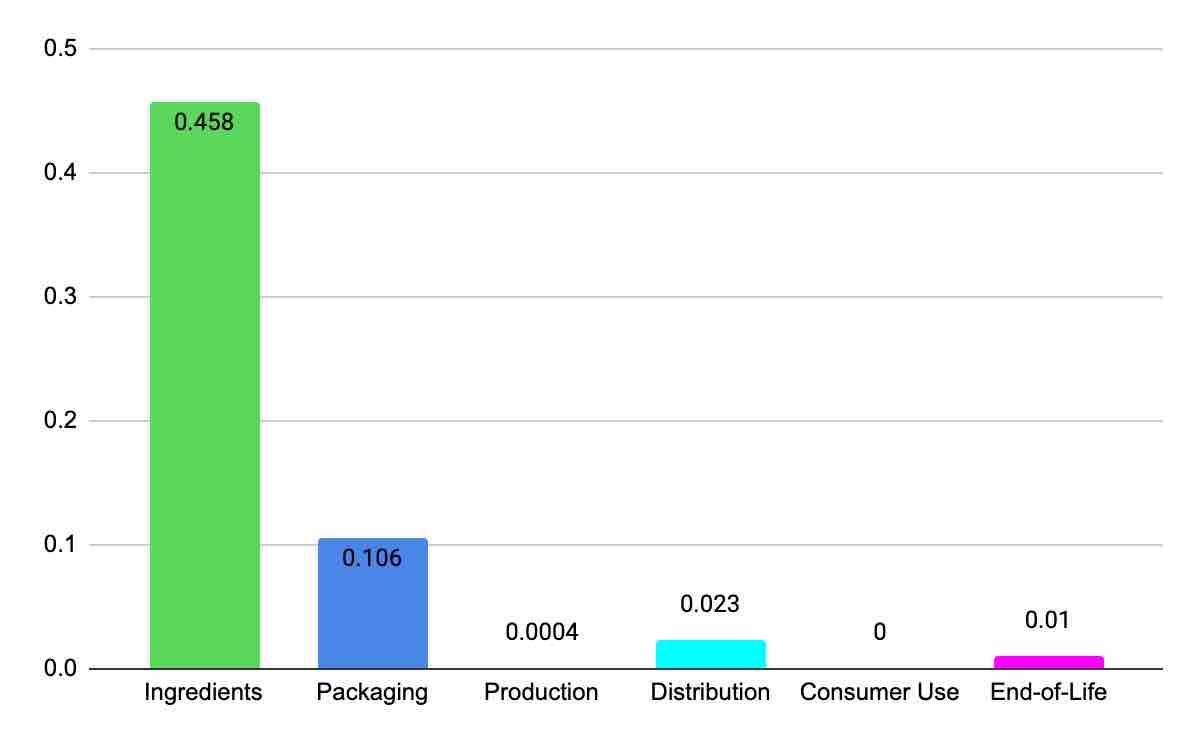
Ritual Becomes First Supplement Brand To Go Public With Each Of Its Products’ Carbon Footprints
Furthering its sustainability leadership, Ritual has become the first supplement brand to share product-level carbon emissions with consumers.
The product-level emissions data, which is included in sustainability scorecards within product image carousals on Ritual’s website, is the result of life cycle assessments of the brand’s 14 products conducted by carbon footprint management platform PlanetFWD. Lindsay Dahl, chief impact officer for Ritual, spotlights Allbirds and Oatley as examples of brands in other merchandise categories that have made product-level carbon emission data public, and she believes Ritual following suit can help usher in a new stage of transparency across the consumer packaged goods landscape.
“We’re obviously proud to be the first within our category, but we think it’s hopefully something that can become a new trend that is not only an important way for businesses to show that they’re putting in the real work around understanding what their climate impacts are, but in also doing the important work around, how can you change your business in order to reduce those impacts over time?” says Dahl, former SVP of mission at Beautycounter. “People have been asking what’s new in the sustainability space and not from a marketing standpoint. We know we have to rapidly accelerate on meaningful progress on a lot of different topics, climate change being at the top of the list.”

Ritual’s product-level assessments weren’t conducted in isolation. With Dahl’s guidance, the brand has constructed a three-pronged sustainability program centered on ingredient traceability, sustainable packaging and action on climate change. Its ingredient traceability drive has led the brand to publicly disclose names of its ingredient suppliers and where they’re located. Along with individual product LCAs, Ritual has pledged to be net zero by 2030 and obtained CarbonFree Certification, a certification run by environmental solutions specialist ClimeCo.
“The supplements industry is built on this premise of protecting people’s health, but has largely been ignoring the biggest health issue of our time, which is climate change,” says Dahl. “So, it felt like we would be remiss to focus on ingredient traceability, talk about sustainable packaging, but not also have a position and do real meaningful work to reduce the amount of carbon that our business is putting out into the world.”
The elements of Ritual’s sustainability program feed off each other. For Dahl, it was really important to dig into the specific inputs that go into Ritual’s products to be able to improve them rather than rely on industry average information that’s typically used by brands. In order to dig into those specific inputs, Ritual’s previous ingredient traceability efforts were crucial.
“The supplements industry is built on this premise of protecting people’s health, but has largely been ignoring the biggest health issue of our time, which is climate change.”
“There’s good work happening in corporate sustainability, but the degree to which you can have a positive impact is directly related to how well you know your suppliers and your supply chain,” says Dahl. “Unfortunately, many companies have very little visibility into who and what is involved in bringing their products to market.”
Grounded in the data from PlanetFWD’s product-level LCAs, Ritual will concentrate on reducing the carbon emissions from its current processes and products and shift future product development to limit carbon emissions from merchandise creation, production and distribution. Carbon offsets through its CarbonFree Certification are on the brand’s carbon emissions reduction agenda, too, but Ritual views carbon offsets as a last resort.
In a Ritual blog post on the topic of carbon offsets, Dahl writes, “We prefer to speak to offsets as investments in renewable energy infrastructure, as the term ‘offset’ can make people believe that emissions are canceled out, which isn’t the case. We first want to reduce the amount of greenhouse gasses being released through our decarbonization planning, while also making these critical renewable energy investments.”

From Ritual’s products and processes standpoint, Dahl highlights pea protein, an ingredient integral to its protein shakes, as having nine times less carbon emissions than whey protein. On the other hand, she mentions that PlanetFWD’s analysis discovered that Ritual’s cardboard shipper boxes and choline are particularly burdensome for its carbon emissions. Plastic scoops that come with its shakes are components Ritual will be reevaluating as well.
“Those [cardboard shipper boxes] were actually one of the higher carbon footprint pieces of our equation, which was actually a little bit surprising to us,” says Dahl. “Choline, which is an essential nutrient and is one that we’re really passionate about, actually has a higher carbon footprint than we had anticipated. That doesn’t mean we are going to back away from choline because it’s especially important for our prenatal audience, but it allows us the opportunity to think about interesting ways to reduce the carbon associated with it, maybe finding suppliers that are sourced from different locations so we can cut down on transportation emissions.”
In general, Dahl estimates LCAs can cost brands $2,500 to $10,000 per product. She points to Bluebird as a platform bringing LCAs to the masses by lowering costs. Ritual partners with Bluebird for rapid LCAs during product development and turns to PlanetFWD for LCAs on finished goods. Dahl explains, “The reason we needed to do those product-level LCAs is because that’s where you get real information to be able to start to make changes to your formulas or inform new product development…Now that we have real data, we can start to take action.”
“The degree to which you can have a positive impact is directly related to how well you know your suppliers and your supply chain.”
Ritual’s customers are attuned to sustainability. In fact, in surveys of them, 90% say sustainability is an important purchase consideration. The consideration of sustainability among consumers on the whole isn’t as great perhaps, but remains prevalent. A 2020 consumer survey by management consultancy McKinsey & Co. found that more than 60% of respondents reported they’d pay more for a product with sustainable packaging.
While consumers are concerned about sustainability, Dahl emphasizes that pinning down the sales influenced by sustainability initiatives isn’t straightforward. “If we’re talking about publicly sharing that carbon footprint, I don’t know if I’m ever going to be able to directly tie sharing that information with increased revenue, and that was never the point of doing it,” she says. “Things just aren’t that kind of linear and clean in my world around showing the direct business impact, but we do know that the customers that shop and stay with us deeply care about protecting the environment in the same way that they care about their health.”
Ritual’s sustainability activities don’t end at its brand. It’s involved with Ceres, a nonprofit that brings together business leaders to fight for climate change policy, and is supporting legislation in California that would require annual carbon emissions accounting by companies generating greater than $1 billion in yearly revenues.

Dahl says, “Now that the Inflation Reduction Act is passed, it’s kind of a question mark of what’s the next key piece of climate legislation at the federal level that’s going to be worked on, but it still is important, and Ritual feels like it’s an important conversation for us to continue to be a part of.”





Leave a Reply
You must be logged in to post a comment.